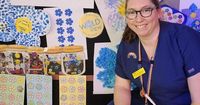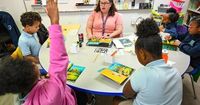From May 25 to 31, 2025, Accessibility Awareness Week took center stage with the theme "Breaking Barriers Together: Paving the Way for an Inclusive Future." This annual event shone a spotlight on the importance of embracing diversity and fostering inclusion, with a particular focus this year on dyslexia—a neurological learning difference affecting millions worldwide.
Dyslexia is often misunderstood. Contrary to outdated stereotypes, it is not connected to a person’s intelligence or visual abilities. Instead, as explained by the American Psychological Association, dyslexia affects how the brain processes information, impacting both reception and expression. Those with dyslexia frequently face challenges in reading, writing, spelling, and verbal communication. Yet, paradoxically, many exhibit remarkable strengths in creativity, problem-solving, and critical thinking.
Despite these strengths, misconceptions linger, falsely equating dyslexia with low intelligence. The book Genius Minds with Dyslexia: Exploring the Legacy highlights that with the right support and interventions, individuals with dyslexia can thrive and make significant contributions across various fields. Importantly, this condition is not limited to children; adults with dyslexia also require adaptable workplaces and higher education environments to succeed.
Ignoring dyslexia or failing to provide support can turn this difference into a debilitating barrier. The National Centre on Improving Literacy offered a vivid analogy in 2020 to illustrate this point: "To understand the impact of dyslexia without support, imagine a person who is unable to ascend stairs but attempts to enter a building without a ramp." This analogy underscores how inaccessible learning environments prevent many from reaching their full potential.
To combat these challenges, the Centre advocates for reimagining and redefining learning methods and platforms. Cultivating a culture of understanding and acceptance is equally vital. Education about dyslexia can dismantle myths and foster empathy, paving the way for more inclusive schools, workplaces, and communities.
The International Dyslexia Association echoes this sentiment, framing dyslexia not as a weakness but as a journey marked by strength, resilience, and success. By championing inclusive practices, society can ensure that all individuals, including those with learning differences, are valued and empowered.
One compelling personal story that embodies this spirit is that of Helen Spencer, a 44-year-old consultant in older people’s services from York. Diagnosed with dyslexia at 37, midway through her medical training, Helen’s journey highlights both the struggles and triumphs of living with this condition.
From a young age, Helen excelled academically, particularly in practical subjects such as music and drama, as well as in science and math where extensive writing was less required. Yet, beneath these successes, she harbored doubts about her academic abilities, especially as she pursued a career in medicine.
Initially, Helen studied drama at university and even established an international theatre company while working part-time in a GP practice. However, her passion for psychiatry never waned, leading her to undertake a pre-medical course with distinction and secure a scholarship to Manchester University’s medical school.
Throughout her medical training, Helen’s story was one of contrasts: she consistently topped practical exams and placements but struggled with written tests, often feeling overwhelmed in lecture halls. She faced multiple exam failures and extensions while watching her peers advance, which left her questioning her capabilities.
It wasn’t until a fellow junior doctor suggested a reading test that Helen was diagnosed with dyslexia. This revelation brought both relief and new challenges. Initially, she felt ashamed and feared being perceived as an unsafe doctor. But as she learned more, Helen realized that dyslexia influences much more than reading and writing—it shapes perception, problem-solving, concentration, and sensory processing.
Discovering a community of successful dyslexics was empowering. Helen found inspiration in pioneers who, like her, had felt misunderstood and forced to work twice as hard in environments not designed for their thinking styles. She notes, "Eighty per cent of dyslexics leave school unidentified and most of them will be high achievers who have spent years learning how to cope and compensate."
Over the past decade, Helen has channeled her experiences into developing a medical education program that uses applied drama techniques to enhance communication and clinical psychiatry training. Her work has been presented at the Royal College of Psychiatrists Medical Education Conference and featured in their neurodevelopmental psychiatry newsletter.
Helen emphasizes the importance of recognizing the unique strengths dyslexics bring to the table. "If we only focus on the weaknesses, we will never benefit from their unique gifts," she asserts. Today, she is proud to identify as dyslexic and grateful for the strengths her condition has fostered. "It may not have always been easy, but I wouldn’t change it for the world," she reflects.
Accessibility Awareness Week is more than a moment to acknowledge differences; it’s a call to action. It challenges us to break down barriers, dispel myths, and build environments where everyone can thrive. Stories like Helen’s and the insights from leading organizations remind us that embracing diversity enriches society as a whole.
As we move forward, fostering understanding and inclusive practices in education, workplaces, and communities will be crucial. When we celebrate the varied ways people think and learn, we pave the way for a future where no one is left behind—where everyone, regardless of ability, has the chance to shine.


